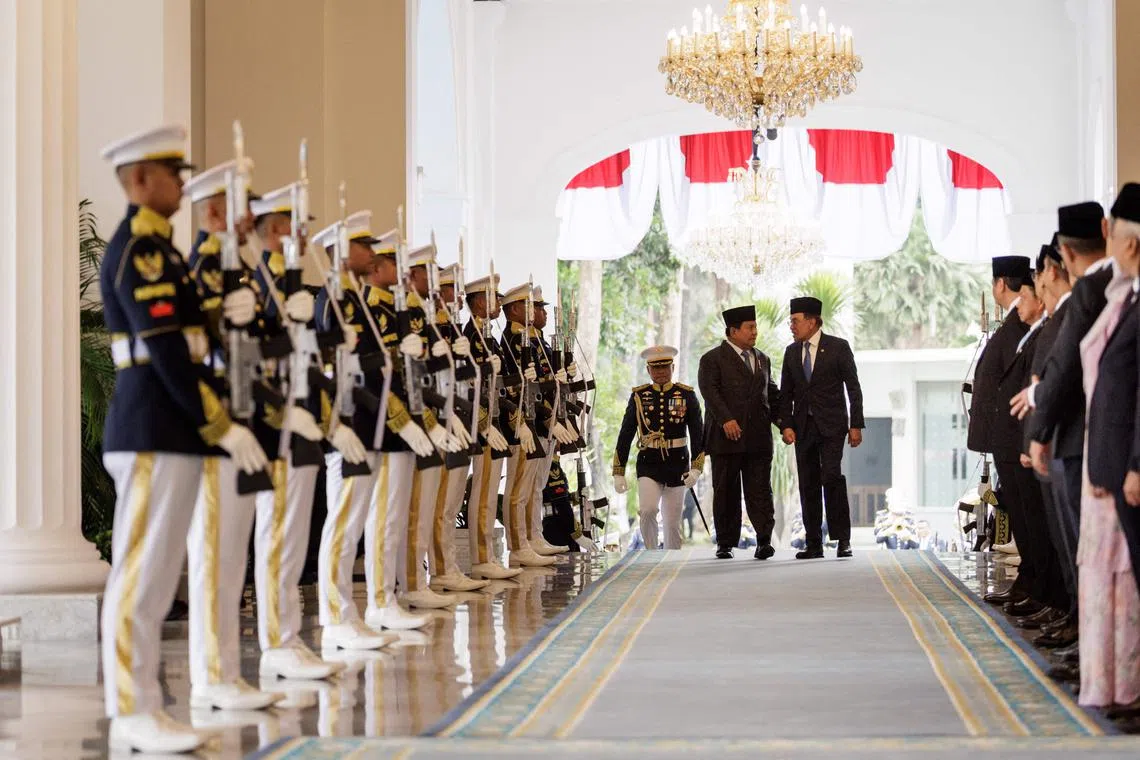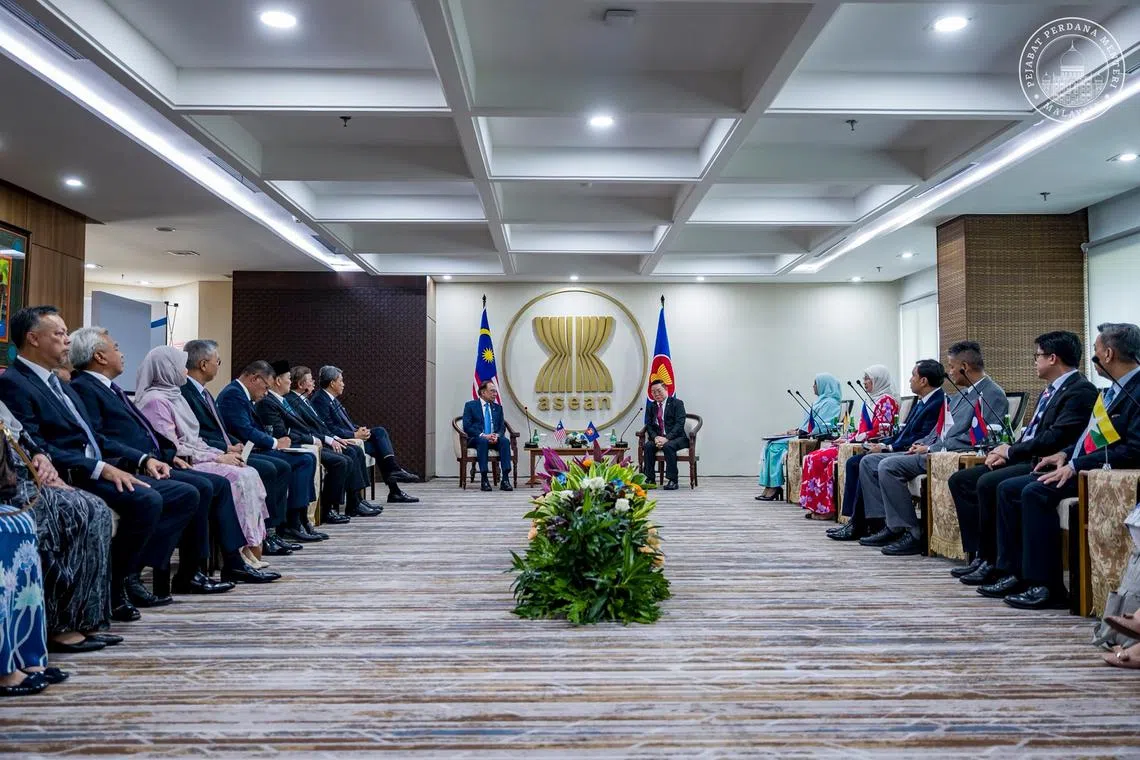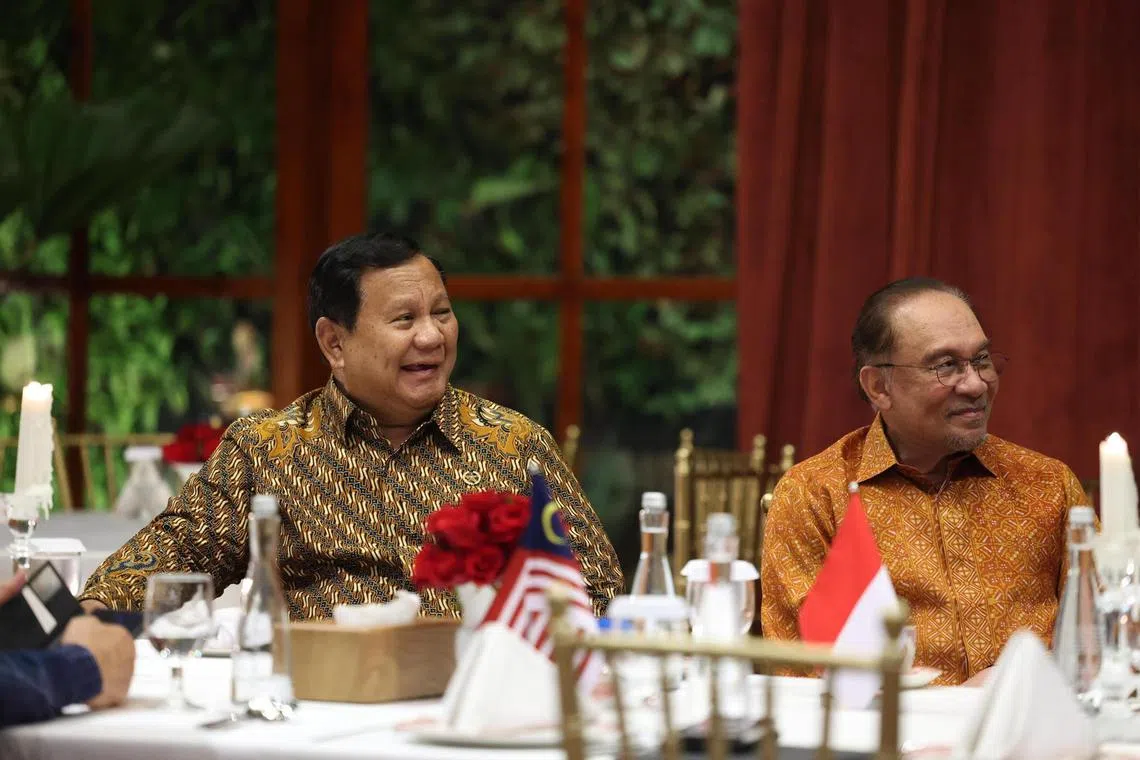Cambodia-Thailand peace efforts hailed by Asean founding members amid ceasefire at border
Sign up now: Get insights on the biggest stories in Malaysia

Malaysia's Prime Minister Anwar Ibrahim (right) and Indonesias President Prabowo Subianto walk together ahead of their bilateral meeting at the Presidential Palace in Jakarta, on July 29.
PHOTO: AFP
Follow topic:
- Malaysia, as Asean chair, mediated a ceasefire between Cambodia and Thailand after a deadly border conflict, involving US and China's participation.
- Singapore and Indonesia lauded Malaysia's mediation, emphasising Asean's role in regional peace and the importance of dialogue and consensus.
- Malaysian PM Anwar and Indonesian President Prabowo highlighted the need for Asean unity and peaceful conflict resolution, reaffirming commitment to regional stability and cooperation.
AI generated
KUALA LUMPUR/JAKARTA – Despite the dangerous and escalating situation at the Thai-Cambodian border, it was “both vital and possible” to bring the two countries to the negotiating table, said Malaysian Prime Minister Anwar Ibrahim on July 29.
The July 28 peace talks between Cambodia and Thailand, which took place in Putrajaya with the help of Malaysia, reflect not only the strength of Asean’s convening power, but also the constructive engagement of its partners in safeguarding regional stability, said Datuk Seri Anwar, speaking at the Asean Secretariat in Jakarta while on an official visit to Indonesia.
“I spoke to both leaders, took care to listen to their perspectives, and urged them to find common ground in the interest of ensuring no more lives were lost. With the participation of the United States and China, both sides agreed to an immediate and unconditional ceasefire (on July 28),” he said, while also thanking US President Donald Trump and Chinese President Xi Jinping for their participation in ensuring the ceasefire.
Representatives from the US and China were present at the July 28 meeting, which Malaysia said was co-organised by Washington, with Beijing’s active participation.
“The presence and cooperation of all parties reaffirm that peace is best achieved through dialogue, mutual respect, and a shared commitment to stability,” said Mr Anwar.
At least 40 people – most of them civilians – have been killed and more than 300,000 displaced since violence broke out on July 24
Recounting the events that led to the ceasefire agreement between Cambodia’s Prime Minister Hun Manet and Thailand’s Acting Prime Minister Phumtham Wechayachai after a deadly five-day border battle, Mr Anwar said Malaysia, in its capacity as Asean chair, had the “responsibility” of hosting both leaders at a time when the clashes “had become a cause for grave concern to us all”.
Thai and Cambodian military commanders held further talks on July 29,
The halting of violence and successful peace efforts mediated by Malaysia have marked a diplomatic win for Asean, whose relevance has been increasingly questioned amid inaction on other regional challenges.
And other founding members of the regional grouping – Singapore and Indonesia – also lauded the mediation efforts to keep the peace in the region and to strengthen integration within the grouping.
Singapore Prime Minister Lawrence Wong told the audience at the Global-City Singapore: SG60 and Beyond conference on July 29 that he had spoken to Mr Anwar the night before to congratulate him on the successful mediation.
“I am glad that with Malaysia’s mediation, things have calmed down. Both sides have agreed,” said Mr Wong at the event hosted by the Institute of Policy Studies and the Singapore Business Federation.
He added: “We hope that agreement will hold, and both sides will commit to and continue with the ceasefire and then open the border, and things will progress from here.”

The halting of violence and successful peace efforts mediated by Malaysia have marked a diplomatic win for Asean, whose relevance has been increasingly questioned amid inaction on other regional challenges.
PHOTO: ANWAR IBRAHIM/FACEBOOK
During his policy speech at the Asean Secretariat, Mr Anwar also emphasised the need for unity and cohesion within the grouping, while cautioning against potential conflict.
“We cannot afford an Asean that is weak, fragmented or in conflict with each other – our national fortunes rise or fall with the region. In these increasingly polarised times, Asean must continue to harness its convening power to advance dialogue, diplomacy, and strategic trust, while fostering space for meaningful cooperation.”
Meanwhile, at a long-delayed bilateral consultation with Mr Anwar earlier on July 29, Indonesian President Prabowo Subianto called the ceasefire between Cambodia and Thailand
In a closed-door meeting at the Presidential Palace, the two leaders discussed a wide range of strategic issues, from regional security to bilateral disputes. Both agreed that dialogue and consensus must remain the foundation of Asean cooperation.
The last such consultation took place in 2017, and further meet-ups were postponed due to the Covid-19 pandemic as well as political transitions in Malaysia. The Indonesian Foreign Ministry described the revived meeting as “a timely opportunity for both leaders to provide direction for enhancing bilateral cooperation in the future”.

Indonesian President Prabowo Subianto and Malaysian Prime Minister Anwar Ibrahim at a dinner in Mr Prabowo's residence in South Jakarta, on July 28.
PHOTO: PRABOWO SUBIANTO/FACEBOOK
Mr Prabowo opened the meeting by commending Mr Anwar’s leadership in brokering the ceasefire.
“First of all, I would like to extend my congratulations on the leadership of Datuk Seri (Anwar) in leading Asean. You succeeded in mediating and securing a ceasefire in the conflict between Thailand and Cambodia. This is something we are grateful for.”
He added that Indonesia stood ready to support Malaysia’s efforts.
“Thank you. This is a breakthrough, a very significant one. We want Asean to always resolve conflicts through peaceful means, through consultation, deliberation and negotiation,” Mr Prabowo said.
Mr Anwar, who is in Jakarta for the 13th Annual Consultation between the two countries, underlined that maintaining peace in the region is a shared responsibility.
He said Asean member countries – especially Malaysia, Indonesia, Singapore, Brunei and the Philippines – will be “responsible for monitoring the peace process”.
A statement from the Indonesian presidential secretariat described the meeting as a milestone in strengthening bilateral ties and reaffirming the two countries’ commitment to regional peace and prosperity.
Mr Prabowo and Mr Anwar also focused on bilateral priorities between the two countries. These included longstanding issues such as maritime boundaries and labour rights, which both leaders said should be resolved through peaceful means.
“In essence, we want to resolve all issues through consultation, negotiation and consensus,” said Mr Prabowo. “I believe that is our principle – especially since we are countries with similar backgrounds, cultures, religion and shared roots.”

